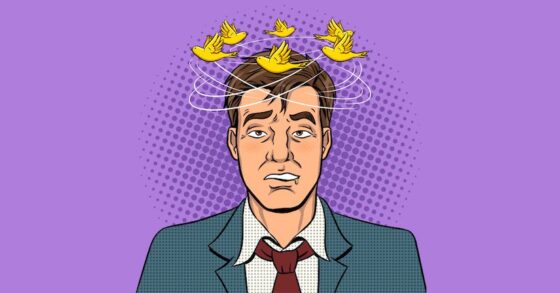Vertigo, the unsettling sensation of spinning or whirling, can disrupt daily life and cause immense discomfort. In this comprehensive article, we will delve into the definition of vertigo, explore its top three causes in detail, and provide in-depth natural solutions for managing and alleviating vertigo symptoms. By incorporating diet, hydration, sleep, herbs, and other lifestyle adjustments, individuals experiencing vertigo can potentially find long-lasting relief and regain their equilibrium.
I. Understanding Vertigo: Vertigo is a form of dizziness that results from an underlying problem in the balance and vestibular system. It is often associated with a false sense of movement, such as the perception of oneself or the surroundings spinning, tilting, or swaying. While vertigo itself is not a standalone condition, it serves as a symptom of various underlying causes. Understanding the mechanisms and triggers of vertigo is crucial for effective management.
Top 3 Causes of Vertigo:
- Benign Paroxysmal Positional Vertigo (BPPV): Benign Paroxysmal Positional Vertigo (BPPV) is the most common cause of vertigo. It occurs when tiny calcium crystals, known as otoconia or canaliths, become dislodged from the otolithic organs in the inner ear and enter the semicircular canals. These crystals interfere with the normal flow of fluid responsible for balance, leading to vertigo symptoms. The most common trigger for BPPV is a change in head position, such as rolling over in bed or tilting the head backward.
Individuals with BPPV experience brief episodes of vertigo, typically lasting less than a minute, triggered by specific head movements. Accompanying symptoms may include nausea, lightheadedness, and imbalance. Diagnosis is usually made through a series of positional tests performed by a healthcare professional. Canalith repositioning maneuvers, such as the Epley maneuver, can help relocate the dislodged crystals to their proper position, providing relief from vertigo symptoms.
- Ménière’s Disease: Ménière’s disease is a chronic condition characterized by an abnormal buildup of fluid in the inner ear. The exact cause of Ménière’s disease is unknown, but it is believed to result from a combination of genetic and environmental factors. The excessive fluid disrupts the normal functioning of the inner ear, leading to episodes of vertigo, fluctuating hearing loss, tinnitus (ringing in the ears), and a feeling of fullness in the affected ear.
Individuals with Ménière’s disease experience vertigo episodes that can last from 20 minutes to several hours. These episodes are often unpredictable and can be accompanied by severe nausea and vomiting. Lifestyle modifications play a crucial role in managing Ménière’s disease. Reducing salt intake helps to minimize fluid retention, while managing stress levels and avoiding triggers such as caffeine and alcohol can help alleviate symptoms. Medications, such as diuretics and vestibular suppressants, may be prescribed to control vertigo attacks.
- Vestibular Migraine: Vestibular migraine is a type of migraine that includes vertigo as a primary symptom. It is estimated that up to 40% of people with migraines experience vestibular symptoms, including vertigo. The exact mechanism of vestibular migraines is not fully understood, but it is believed to involve abnormal brain activity that affects the vestibular system.
Vestibular migraines are characterized by episodes of vertigo lasting minutes to hours, often accompanied by severe headaches, sensitivity to light and sound, and visual disturbances. Triggers for vestibular migraines can
vary from person to person and may include stress, certain foods, hormonal changes, and lack of sleep. Identifying and avoiding trigger factors is an essential step in managing vestibular migraines.
Treatment for vestibular migraines involves a multifaceted approach. Lifestyle modifications, such as maintaining a regular sleep schedule, managing stress levels, and practicing relaxation techniques, can help reduce the frequency and intensity of vertigo episodes. Medications prescribed by a healthcare professional, including migraine-specific medications and preventive drugs, may be necessary to manage symptoms effectively.
You Can Use These 15 Exercises To Stop Vertigo By clicking here
3 Natural Solutions for Vertigo Relief:
- Diet and Hydration: Proper nutrition and hydration play a vital role in supporting overall health, including the management of vertigo symptoms. Consider the following dietary guidelines:a. Limit Salt Intake: Reducing sodium consumption can help minimize fluid retention, which can contribute to vertigo in conditions like Ménière’s disease. Avoid processed foods, fast food, and canned goods, as they tend to be high in sodium. Instead, opt for fresh fruits, vegetables, lean proteins, whole grains, and healthy fats.
b. Stay Hydrated: Dehydration can worsen symptoms of dizziness and imbalance. Ensure an adequate fluid intake throughout the day, preferably water. Limit the consumption of diuretic beverages like caffeine and alcohol, as they can deplete the body of water and electrolytes.
c. Consider a Balanced Diet: Certain nutrients have been associated with inner ear health. Including foods rich in vitamin B-6, magnesium, and antioxidants in your diet may be beneficial. Good sources include leafy greens, nuts, seeds, whole grains, fish, poultry, and fresh fruits.
- Restful Sleep: Quality sleep is essential for overall well-being and can significantly impact vertigo symptoms. Follow these tips to promote restful sleep:a. Establish a Sleep Routine: Go to bed and wake up at consistent times to regulate your body’s internal clock. This helps improve sleep quality and reduces the likelihood of fatigue-induced vertigo.
b. Create a Relaxing Environment: Make your bedroom conducive to sleep by keeping it cool, dark, and quiet. Remove electronic devices and consider using blackout curtains, earplugs, or a white noise machine if needed.
c. Practice Relaxation Techniques: Engage in relaxation exercises, such as deep breathing, progressive muscle relaxation, or meditation, before bed to calm the mind and promote better sleep.
- Herbal and Supplemental Support: Several herbs and supplements have shown potential in managing vertigo symptoms. While individual responses may vary, consider the following options:a. Ginkgo Biloba: Ginkgo biloba is an herb known for its potential to improve blood circulation and alleviate symptoms of inner ear disorders. It may help reduce the frequency and intensity of vertigo episodes. Consult with a healthcare professional before starting any herbal supplement.
b. Turmeric, Ginger & Ashwagandha: Ginger has anti-inflammatory properties and is commonly used to alleviate nausea and vomiting associated with vertigo. Ginger tea, capsules, or fresh ginger added to meals can be beneficial. However, ginger may interact with certain medications, so consult a healthcare professional before using it as a supplement. I found an incredible organic blend of turmeric, ginger ashwagandha from Omica Organics in a liquid tincture form. Click here to visit their website and use Healthywildfree to get 10% off your order. This company tests for heavy metals and ensures not only organic but biodynamic ingredients. This is the highest quality turmeric, ginger, Ashwagandha that you can get in the market. I guarantee it.
c. Vitamin D: Adequate levels of vitamin D have been associated with a reduced risk of developing BPPV. Sunlight exposure, fortified foods, and vitamin D supplements can help maintain optimal levels. The best way to get vitamin D is from the sun. Get outside and expose your skin WITHOUT sunscreen. Yes, you heard that right. Sunscreen blocks vitamin D absorption. If you live in an area that doesn’t have much sun, this supplement is vitamin d3 + k2 and is the most bioavailable one I have found. Click here for vitamin D supplementation.
d. Magnesium: Some studies suggest that magnesium supplementation may help reduce the frequency and severity of migraines, including vestibular migraines. Foods rich in magnesium include leafy greens, nuts, seeds, and legumes. I have taken a few different magnesium supplements personally. One from Omica Organics (the same company from above) that is a spray form of magnesium, so make sure to add this to your cart and use the discount code Healthywildfree for 10% off your order. Also, save this discount code because it saves you 10% on every order and their products are organic and already cheap compared to competitors. I love their products!
I have also taken a supplement called magnesium breakthrough which is a pill form that works very well also. You can click here to visit Magnesium breakthrough. Use the discount code healthywildfree to save 10% on your magnesium breakthrough order. The pills do cost a bit more than the spray, but it also contains different forms of magnesium which benefit different parts of the body.
Vertigo can significantly impact daily life, but with a comprehensive understanding of its causes and natural solutions, individuals can take proactive steps towards finding relief. By implementing the suggested lifestyle adjustments, including dietary modifications, adequate hydration, prioritizing restful sleep, and considering herbal and supplemental support, individuals may experience a reduction in vertigo symptoms and an improved sense of balance.
It is important to note that while natural solutions can be effective for some individuals, each person’s experience with vertigo is unique, and what works for one person may not work for another. It is advisable to consult with a specialist.





